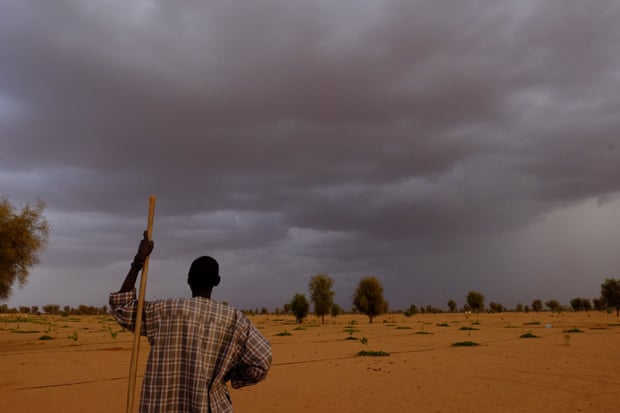By 2020, 60 million people from sub-Saharan Africa are expected to migrate because of desertification. The Great Green Wall is a $8bn project restoring degraded land. But will it encourage people to stay or earn the money to go?
(....)
To encourage men like Ndiaga and their children to stay in their countries of birth, the World Bank, the EU and other international donors and development organisations are banking on gardens like this one. It is part of the Great Green Wall, an $8bn 4,000-mile effort to stymie the environmental devastation of climate change and the human misery that comes with it. This orderly garden isn’t just a local source of money and food, it’s also one link in an ambitious continent-wide chain seeking to reshape opportunities and stave off the wreckage of climate change.
While donors hope the project will encourage would-be migrants to enjoy better conditions at home, some migration experts say such development policies might have the opposite effect. With a little more money in peoples’ pockets, migration becomes more tenable.
Lees het hele artikel hier: https://www.theguardian.com/global-development-professionals-network/2017/jul/19/will-africas-great-green-wall-discourage-migration-to-europe
Mijn collega Jolanda van der Vliet schreef de volgende reactie:
Jolanda van der Vliet
When all the signs tell us that environmental degradation contributes to mass displacement, we need to consider what type of action makes sense. Although legal regimes generally don't focus on prevention or adaptation, these are sensible ways to deal with especially slow-onset degradation. Environmental migration should be approached as a security, human rights and environmental problem. These combined approaches should lead to a flexible apllication of the corresponding legal regimes.
******************************************************
Wellicht is mijn boekenblog ook interessant: http://dutchysbookreviews.blogspot.nl/l
In the first decades of the nineteenth century, no place burned more brightly in the imagination of European geographers––and fortune hunters––than the lost city of Timbuktu. Africa's legendary City of Gold, not visited by Europeans since the Middle Ages, held the promise of wealth and fame for the first explorer to make it there. In 1824, the French Geographical Society offered a cash prize to the first expedition from any nation to visit Timbuktu and return to tell the tale.Interessant artikel? Deel het eens met uw netwerk en help mee met het verspreiden van de bekendheid van dit blog. Er staan wellicht nog meer artikelen op dit weblog die u zullen boeien. Kijk gerust eens rond. Zelf graag wat willen plaatsen? Mail dan webmaster@vreemdelingenrecht.com In verband met geldwolven die denken geld te kunnen claimen op krantenartikelen die op een blog als deze worden geplaatst maar na meestal een dag voor de krantenlezers aan leeswaardigheid hebben ingeboet terwijl wij vreemdelingenrecht specialisten ze soms wel nog jaren gebruiken om er een kopie van te maken voor een zaak ga ik over tot het plaatsen van alleen het eerste stukje. Ja ik weet het: de kans dat u doorklikt is geringer dan wanneer het hele artikel hier staat en een kopie van het orgineel maken handig kan zijn voor uw zaak. Wilt u zelf wat overnemen van dit weblog. Dat mag. Zet er alleen even een link bij naar het desbetreffende artikel zodat mensen niet alleen dat wat u knipt en plakt kunnen lezen maar dat ook kunnen doen in de context. Subscribe to Vreemdelingenrecht.com blog by Email





Geen opmerkingen:
Een reactie posten